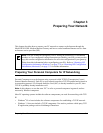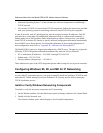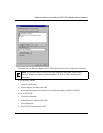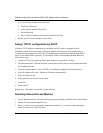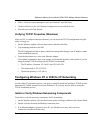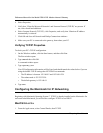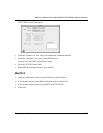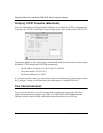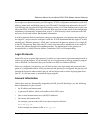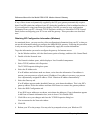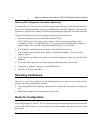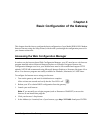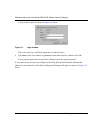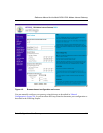
Reference Manual for the Model DG814 DSL Modem Internet Gateway
Preparing Your Network 3-9
For a single-user Internet account, your ISP supplies TCP/IP configuration information (such as IP
address, subnet mask and default gateway) and VPI and VCI multiplexing information for one PC.
Your ISP may also provide other login information, such as User Name and Password, in the case
where the PPPoE or PPPoA protocol is required. With a typical account, much of the configuration
information is dynamically assigned when your PC is first booted up while connected to the ISP,
and you will not need to know that dynamic information.
In order to share the Internet connection among several computers, your gateway takes the place of
the single PC, and you need to configure it with the TCP/IP information that the single PC would
normally use. When the gateway’s ADSL port is connected, the gateway appears to be a single PC
to the ISP. The gateway then allows the PCs on the local network to masquerade as the single PC
to access the Internet through the broadband modem. The method used by the gateway to
accomplish this is called Network Address Translation (NAT) or IP masquerading.
Login Protocols
Some ISPs require a special login protocol, in which you must enter a login name and password in
order to access the Internet. If you normally log in to your Internet account by running a program
such as WinPOET or EnterNet, then your account uses PPP over Ethernet (PPPoE).
When you configure your gateway, you will need to enter your login name and password in the
gateway’s configuration menus. After your network and gateway are configured, the gateway will
perform the login task when needed, and you will no longer need to run the login program from
your PC. It is not necessary to uninstall the login program.
Account Information
Unless these items are dynamically assigned by the ISP, your ISP should give you the following
basic information for your account:
• An IP address and subnet mask
• A gateway IP address, which is the address of the ISP’s router
• One or more domain name server (DNS) IP addresses
• Host name and domain suffix
For example, your account’s full server names may look like this:
mail.xxx.yyy.com
In this example, the domain suffix is
xxx.yyy.com.



